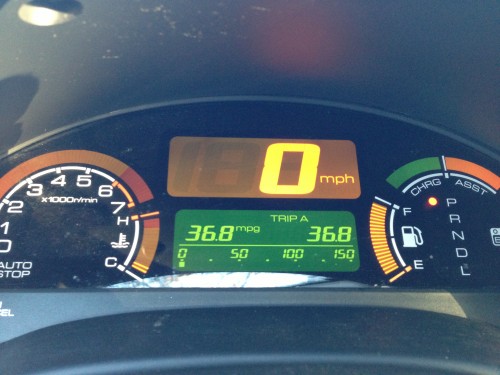Anyone know why automobiles get such worse fuel economy in the winter than in the summer? I know my diesel van gets worse mileage because of the winter mix of diesel, but why do regular gas automobiles get such worse mileage?
I go to this website The Clymb every few days. Right now they have a bunch of cycling stuff cheap on it. I remember when they used to sell one item at a time and now they have dozens of different manufactures. It is a member’s only site, but only takes a minute to sign in, just an email address and password. They have Crank Brothers Candy pedals in the bike section. Last week they had Vittoria tubulars, but I didn’t see them today. I get $25 if someone I refer eventually buys something. They sell lots of other stuff other than cycling related too, mostly camping, climbing, hiking, etc. Here is the link.
Does anyone have any leads where to get some Clement PDX tubulars? Seems like they are sold out just about everywhere.
The weather here in Kansas got cold recently. Anyone know what you body does to compensate or adjust for cold weather. I know when you go to altitude, your body kicks in to make more red cells, but what changes occur in our bodies, so 40 degrees seems freezing cold in the summer and fairly warm in the dead of winter.
I did a blood test a week ago and then had my finger pricked and my hemoglobin measured just a few days later. How can my hemoglobin change 1.5 points in just a few days? I’d assume I would feel a lot better riding with a hemoglobin reading of nearly 17 g/gL.
I’m considering racing cross this weekend. There is a race down in Tulsa on Sunday. There is also the Iowa State Cross Championships near Des Moines.






http://alternativefuels.about.com/od/environmentalimpact/a/winterfuelecon.htm
Old Man Winter’s Pinch
So, why exactly does colder weather throw a wrench at most vehicles’ regular fuel economy? Well, there are lots of reasons actually, but friction is a big one. While it’s always an issue, cold weather increases friction on almost every front. Most vehicle fluids, from motor oil and transmission fluid to power steering fluid and differential gear oil, are thicker and more resistant to flowing when cold. Translation: Harder to pump, more work for the engine. Another less obvious source of friction is rolling resistance.
…more at the link
On the mileage question, I know mine gets ‘worse’ mileage because I let it warm up for about 10 minutes every morning…..that’s about an hour a week of just running without driving. Its probably not much, but definitely affects the overall MPG.
http://www.ebay.com/sch/i.html?_trksid=p5197.m570.l1313&_nkw=Clement+PDX+tubulars&_sacat=0&_from=R40
I imagine a big reason your fuel economy drops is because cold air is much more dense than warm air. In order to keep the mixture (fuel:air ratio) correct, the car pumps more fuel into each cylinder. This means your car is creating more power when it’s colder, but it’s also using more gas. That’s probably just one of many reasons though, and it shouldn’t make a huge difference once you are up to speed and cruising since you will not be pressing the accelerator pedal as far. During acceleration, you are probably eating extra gas though. I dunno, just my theory.
In cold weather your body looks to build insulation and preserve core temp. So as cyclists we’re screwed because most of us have no insulative layer! Plus we tend to burn more fat because it is easier to metabolize than carbs or protein, more bang for your buck. Blood is shunted from your extremities to your core, thus cold hands and feet. There is an adaptive period, just like with hot weather cycling, which you chronicled so well this summer. As for your Hemoglobin, I suspect you were a bit dehydrated as this will increase your levels due to less plasma volume. Also the finger prick devices have a fairly high margin for error, +/- 3-4%.
Don’t forget the KS State CX Championships at Hummer Sports Park on the 8th of December!
Friction is definitely a factor. I remember my Dad changing to lighter weight motor oil in the winter. Even he never went so far as to change transmission fluid! I have also heard that there is a ‘winter blend’ and ‘summer blend’ of fuel for certain regions. Maybe to help with cold starts?
Contact Brandon Dwight or Pete Weber at Boulder Cycle Sport on the Clement tubulars…I think I remember a FB post showing they had a bunch in stock for CX season.
A good visualisation of this principle is shifting a manual when it is 50 below. When you first start the car the gear oil is so thick it takes two hands to move the stick.
As others have mentioned, friction is a big factor.
The other is that until the engine, drivetrain, etc are at their design operating temperature, the moving parts are not in proper fit / alignment / seal. Reason being that parts made of dissimilar materials have different rates of thermal expansion. This is especially true of pistons within cylinders — which is exactly why you’re not supposed to subject a cold engine to high revs, because the piston slap can permanently damage the engine. Until the engine is properly warmed up, a significant amount of unburned fuel escapes through the gap between the piston and cylinder wall.
Just like you need the choke to start a cold older engine, the fuel injection enriches the mixture so the car will run in the winter. Since it is cold, the time it takes to lean out the mixture takes longer. The car is running richer for a longer period.
Yes and no…true for port-injection engines which still rely on stoichiometric burning, but the current generation of direct-injection, stratified-charge engines can burn very lean even when cold.
More..
http://www.metrompg.com/posts/winter-mpg.htm
If it’s a hybrid it is partly because the batteries become very inefficient when it is cold. Also, denser air hurts the aerodynamics more than it helps the combustion in the engine. A Corolla gets better mpg than a Prius in cold weather.
Steve, you should definitely race cross this weekend. Come on down to Tulsa and race at Rock the Mohawk. Sand, stairs, barriers and fun – guaranteed to be a blast. Free entry for world champs. Bring it.
http://facebook.com/RockTheMohawk/
http://twitter.com/RockTheMohawkCX/
The only time I have ever noticed any difference in mileage was when we lived in snowy Buffalo NY. Driving on snowy streets was much less efficient because I was sliding and slipping around every corner when compared to driving on dry roads. Here in SC where we live now I see no difference when driving in 25 degree temps or 100 degree days.
When in Switzerland i can buy 95 or 98 premium for the same price . When i buy 98 octane i find i get less MPG , go figure ?
Took it for granted that the engine needs to be warmer in winter to get results .
Steve,
I have a few pairs o’ Clement PDX tubulars in stock here in Omaha right now. Would love to send a few your way. Let me know.